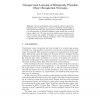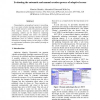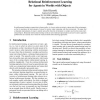1166 search results - page 93 / 234 » Negotiating Using Rewards |
116
Voted
ICRA
2009
IEEE
15 years 8 months ago
2009
IEEE
Abstract— Least-squares policy iteration is a useful reinforcement learning method in robotics due to its computational efficiency. However, it tends to be sensitive to outliers...
114
click to vote
BMCV
2000
Springer
15 years 6 months ago
2000
Springer
Recent psychological and neurological evidence suggests that biological object recognition is a process of matching sensed images to stored iconic memories. This paper presents a p...
79
Voted
ICALT
2007
IEEE
15 years 4 months ago
2007
IEEE
Using adaptive, personalized courses is rewarding, as it can create a better learning experience, tailored for a specific learner’s needs. The process of creating these courses,...
134
Voted
AAMAS
2002
Springer
15 years 2 months ago
2002
Springer
In reinforcement learning, an agent tries to learn a policy, i.e., how to select an action in a given state of the environment, so that it maximizes the total amount of reward it ...
112
click to vote
NIPS
2001
15 years 3 months ago
2001
Policy gradient methods for reinforcement learning avoid some of the undesirable properties of the value function approaches, such as policy degradation (Baxter and Bartlett, 2001...



